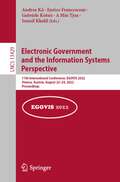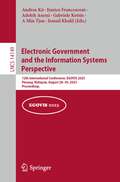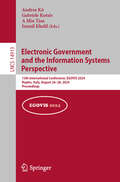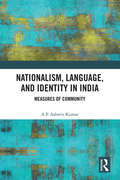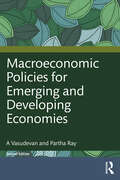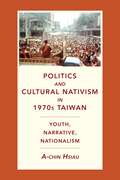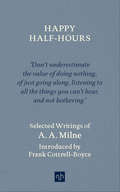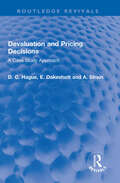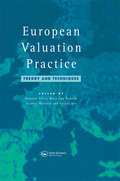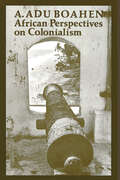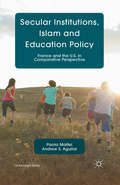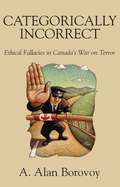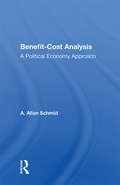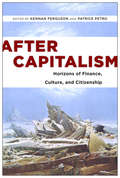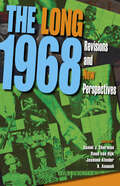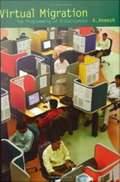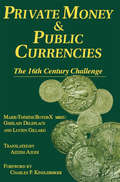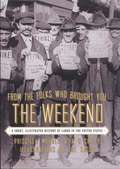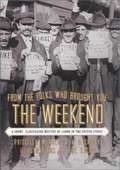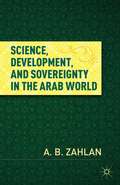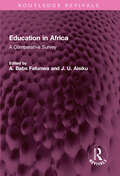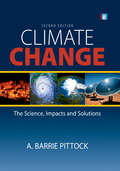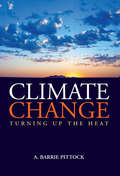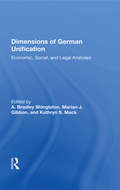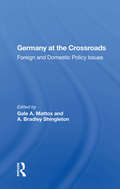- Table View
- List View
Electronic Government and the Information Systems Perspective: 11th International Conference, EGOVIS 2022, Vienna, Austria, August 22–24, 2022, Proceedings (Lecture Notes in Computer Science #13429)
by Enrico Francesconi Andrea Kő Ismail Khalil A Min Tjoa Gabriele KotsisThis volume LNCS 12429 constitutes the papers of the 11th International Conference on Electronic Government and the Information Systems Perspective, EGOVIS 20221, held in Vienna, Austria, in August 2022. The 11 full papers presented were carefully reviewed and selected from 16 submissions and focus on information systems and ICT aspects of e-government. The papers are organized in 3 topical sections: e-government theoretical background; semantic technologies and legal issues;; artificial intelligence and machine learning in e-government context.
Electronic Government and the Information Systems Perspective: 12th International Conference, EGOVIS 2023, Penang, Malaysia, August 28–30, 2023, Proceedings (Lecture Notes in Computer Science #14149)
by Enrico Francesconi Ismail Khalil A Min Tjoa Gabriele Kotsis Andrea Kö Adeleh AsemiThis book constitutes the proceedings of the 12th International Conference on Electronic Government and the Information Systems Perspective, EGOVIS 2023, which took place in Penang, Malaysia, during August 28-30, 2023.The 8 full papers presented together with 1 short paper were carefully reviewed and selected from a total of 17 submissions. They were organized in topical sections as follows: e-Government; strategy; artificial intelligence.
Electronic Government and the Information Systems Perspective: 13th International Conference, EGOVIS 2024, Naples, Italy, August 26–28, 2024, Proceedings (Lecture Notes in Computer Science #14913)
by Ismail Khalil A Min Tjoa Gabriele Kotsis Andrea KöThis book constitutes the proceedings of the 13th International Conference on Electronic Government and the Information Systems Perspective, EGOVIS 2024, which took place in Naples, Italy, in August 2024. The 10 full and 5 short papers included in this book were carefully reviewed and selected from 24 submissions. They were organized in topical sections as follows: AI in E-Government; E-Government cases; mobile government and digital inclusion; open government data and security.
Nationalism, Language and Identity in India: Measures of Community
by A P KumarThis book examines linguistic nationalism in India. It focuses on the emergence of language as a marker of identity by analysing themes such as Linguistic Reorganization of States, nationalism, philology, and linguistic identity. Formulating a novel conception of doxastic nature of community experience, the author presents a theory about nationalism as a cultural phenomenon by studying the constraints of western theological apparatuses that limit our understanding of it. The book looks at how an ecclesiastical notion of community is at the heart of the debate around linguistic and national identity – something that is redefining politics the world over. This volume will be useful for scholars and researchers of political studies, political sociology, sociology, historical linguistics and cultural studies.
Macroeconomic Policies for Emerging and Developing Economies
by Partha Ray A VasudevanThis book examines the relevance of the concepts and hypotheses of macroeconomics in the contemporary world. It discusses the current debates on theory and practices of macroeconomic policies with a focus on developing economies emerging from the impact of Covid-19 pandemic. The volume advocates for a symbiotic relationship between macroeconomic policies and development strategies. It analyses several issues related to macroeconomic tools, which include openness, capital flows, exchange rate and financial strategies. It underscores the need to design a development strategy that accounts for the economic context of the countries concerned. Further, the book advocates for well-regulated macrofinancial policies promoting sustainable growth. It also provides recommendations to policy makers on formulating a sound and inclusive macroeconomic policy essential for financial stability. This book will be of interest to students and researchers of macroeconomics, public administration, development studies, management and policymaking. It will also be useful to economists, policymakers and journalists working on emerging and developing economies.
Politics and Cultural Nativism in 1970s Taiwan: Youth, Narrative, Nationalism (Global Chinese Culture)
by A-chin HsiauIn the aftermath of 1949, Taiwan’s elites saw themselves as embodying China in exile both politically and culturally. The island—officially known as the Republic of China—was a temporary home to await the reconquest of the mainland. Taiwan, not the People’s Republic, represented China internationally until the early 1970s. Yet in recent decades Taiwan has increasingly come to see itself as a modern nation-state.A-chin Hsiau traces the origins of Taiwanese national identity to the 1970s, when a surge of domestic dissent and youth activism transformed society, politics, and culture in ways that continue to be felt. After major diplomatic setbacks at the beginning of the 1970s posed a serious challenge to Kuomintang authoritarian rule, a younger generation without firsthand experience of life on the mainland began openly challenging the status quo. Hsiau examines how student activists, writers, and dissident researchers of Taiwanese anticolonial movements, despite accepting Chinese nationalist narratives, began to foreground Taiwan’s political and social past and present. Their activism, creative work, and historical explorations played pivotal roles in bringing to light and reshaping indigenous and national identities. In so doing, Hsiau contends, they laid the basis for Taiwanese nationalism and the eventual democratization of Taiwan.Offering bracing new perspectives on nationalism, democratization, and identity in Taiwan, this book has significant implications spanning sociology, history, political science, and East Asian studies.
Happy Half-Hours: Selected Writings
by A. A. MilneA delightful selection of articles by the ever-popular A. A. Milne, many of which haven't been in print for decades. Introduced by the prize-winning children's author Frank Cottrell Boyce, this volume brings Milne's brilliant non-fiction back to the spotlight.A. A. Milne was a successful writer long before the classic Winnie-the-Pooh stories made him famous. Milne had a talent for regularly turning out a thousand whimsical words on lost hats and umbrellas, golf, married life, cheap cigars, and any amount of life&’s little difficulties. This anthology, spanning four decades of Milne&’s life, includes his fiercely argued writings on pacifism. Happy Half-Hours features the very best of A. A. Milne in one delightful volume.&“Milne&’s gift to write amusingly about the most trivial things is a kind of blessing. The kind that can put you back together again when all else fails.&” —Frank Cottrell-Boyce, from his introduction
Devaluation and Pricing Decisions: A Case Study Approach (Routledge Revivals)
by Douglas Hague W. E. Oakeshott A. A. StrainFirst published in 1974, Devaluation and Pricing Decisions is based on case studies of the export pricing decisions made by nineteen major British companies after the 1967 devaluation.The aim was to look in detail at the decisions that major British firms took after devaluation and to see how they had responded to this major change in government policy. This book shows how far the firms had anticipated the devaluation; what company objectives were at that time and what changes in these objectives, or in pricing and marketing policies, were made to take advantage of new opportunities for exporting and for import substitution. The researchers also examined the actual process of decision making to find what information was available to the decision makers and how they used it. The book is directed to businessmen taking decisions on export prices and marketing in the world of today where foreign exchange rates change frequently. It is also directed towards those responsible for shaping national economic policy. For students of economics, it represents a study showing, in considerable detail, how a number of businesses responded to the 1967 devaluation.
European Valuation Practice: Theory and Techniques
by A. Adair M.L. Downie S. McGreal G. VosThe variability of valuation practice within Europe is perceived as a problem within the globalization of property. This edited textbook examines the practice of real estate valuation in selected countries in Europe. The focus is on countries with well developed real estate markets in which both international and indigenous investors are active. The book is aimed at real estate professionals, financiers, institutional advisers, property researchers and students who require a greater understanding of comparative property appraisal techniques applied across Europe.
African Perspectives on Colonialism (The Johns Hopkins Symposia in Comparative History #15)
by A. Adu BoahenThis history deals with the twenty-year period between 1880 and 1900, when virtually all of Africa was seized and occupied by the Imperial Powers of Europe. Eurocentric points of view have dominated the study of this era, but in this book, one of Africa's leading historians reinterprets the colonial experiences from the perspective of the colonized. The Johns Hopkins Symposia in Comparative History are occasional volumes sponsored by the Department of History at the Johns Hopkins University and the Johns Hopkins University Press comprising original essays by leading scholars in the United States and other countries. Each volume considers, from a comparative perspective, an important topic of current historical interest. The present volume is the fifteenth. Its preparation has been assisted by the James S. Schouler Lecture Fund.
Secular Institutions, Islam and Education Policy: France and the U.S. in Comparative Perspective (St Antony's Series)
by P. Mattei A. AguilarAmidst claims of threats to national identities in an era of increasing diversity, should we be worried about the upsurge in religious animosity in the United States, as well as Europe? This book explores how French society is divided along conflicts about religion, increasingly visible in public schools, and shows the effect that this has had.
Categorically Incorrect: Ethical Fallacies in Canada's War on Terror
by A. Alan BorovoyIf humanity has learned anything from the horrors of the war against terror, it is that our one hope is democracy. The final goal of our country’s actions at home and abroad is the preservation of democracy. This is the lens through which our policies should be discerned, dissected, and amended.Borovoy argues that Canada has pursued an ethically cockeyed war against terror. We have been needlessly dovish abroad and excessively hawkish at home. In order to use military force abroad, the government fussed over the need for UN approval. At home, however, there are no such restraints: without even asking a court, the government may effectively deprive certain perople of the right to make a living. As the author summrizes: "Internationally, key fallacies stem from an undue respect for a rule of law that does not exist. Domestically, key fallacies stem from an undue neglect of a rule of law that does exist."
Benefit-cost Analysis: A Political Economy Approach
by A. Allan SchmidChoice is the name of the game. Government sets the size of the public budget and decides which public projects it will invest in and which transfers and regulations it will implement. To do this systematically the government must have a procedure that displays the consequences of the alternatives. This book is an exposition of benefit-cost analysis (BCA), an analytic framework for organizing thoughts, listing the pros and cons of alternatives, and determining values for all relevant factors so that the alternatives can be ranked. A major question illuminated by this text is whether the results of such an analysis can instruct government--in the sense of telling it what it must do to avoid being labelled stupid, corrupt, irrational, and/or inefficient. How and when, we will ask, can the benefit-cost analyst label a particular governmental investment, policy, or regulation as political (in the pejorative sense) as opposed to economic (in the laudatory sense of being economically justified)? This book will argue that BCA is much like a consumer information system. Consumer information neither tells consumers what to do nor tells them what they should want. However, it does tell them which products will perform in selected ways and at what costs. And this information, together with the independently arrived at wants, helps the consumer make intelligent choices.
After Capitalism: Horizons of Finance, Culture, and Citizenship
by Andrew Ross A. Aneesh Geoff Mann Marcus Bullock Jeffrey Sommers Sherryl Vint Bernard C. Perley Cristina Venegas Esther Leslie Kennan Ferguson Niki Akhavan Patrice Petro Ivan AscherFrom Thomas Piketty to David Harvey, scholars are increasingly questioning whether we are entering into a post-capitalist era. If so, does this new epoch signal the failure of capitalism and emergence of alternative systems? Or does it mark the ultimate triumph of capitalism as it evolves into an unstoppable entity that takes new forms as it engulfs its opposition? After Capitalism brings together leading scholars from across the academy to offer competing perspectives on capitalism's past incarnations, present conditions, and possible futures. Some contributors reassess classic theorizations of capitalism in light of recent trends, including real estate bubbles, debt relief protests, and the rise of a global creditocracy. Others examine Marx's writings, unemployment, hoarding, "capitalist realism," and coyote (trickster) capitalism, among many other topics. Media and design trends locate the key ideologies of the current economic moment, with authors considering everything from the austerity aesthetics of reality TV to the seductive smoothness of liquid crystal. Even as it draws momentous conclusions about global economic phenomena, After Capitalism also pays close attention to locales as varied as Cuba, India, and Latvia, examining the very different ways that economic conditions have affected the relationship between the state and its citizens. Collectively, these essays raise provocative questions about how we should imagine capitalism in the twenty-first century. Will capitalism, like all economic systems, come to an end, or does there exist in history or elsewhere a hidden world that is already post-capitalist, offering alternative possibilities for thought and action?
The Long 1968: Revisions and New Perspectives
by A. Aneesh Jasmine Alinder Daniel J. Sherman Ruud Van DijkDelving into a tumultuous year’s impact on art, culture, and politics, this book “illuminates the often-overlooked histories of 1968” (The Journal of American History).From the mid-1960s to the early 1970s, revolutions in theory, politics, and cultural experimentation swept around the world. These changes had as great a transformative impact on the right as on the left.A touchstone for activists, artists, and theorists of all stripes, the year 1968 has taken on new significance for the present moment, which bears certain uncanny resemblances to that time. The Long 1968 explores the wide-ranging impact of the year and its aftermath in politics, theory, the arts, and international relations—and its uses today.
Virtual Migration: The Programming of Globalization
by A. AneeshAneesh draws on the sociology of science, social theory, and research on migration to illuminate the practical and theoretical ramifications of virtual migration.
Private Money and Public Currencies: The Sixteenth Century Challenge
by M-.T.Boyer- Xambeau A. AzodiFirst Published in 1994. Routledge is an imprint of Taylor & Francis, an Informa company.
From the Folks Who Brought You the Weekend
by Joe Sacco Priscilla Murolo A. B. ChittyHailed in a starred Publishers Weekly review as a work of "impressive even-handedness and analytic acuity . . . that gracefully handles a broad range of subject matter," From the Folks Who Brought You the Weekend is the first comprehensive look at American history through the prism of working people. From indentured servants and slaves in the seventeenth-century Chesapeake to high-tech workers in contemporary Silicon Valley, the book "[puts] a human face on the people, places, events, and social conditions that have shaped the evolution of organized labor" (Library Journal).From the Folks Who Brought You the Weekend also "thoroughly includes the contributions of women, Native Americans, African Americans, immigrants, and minorities, and considers events often ignored in other histories," writes Booklist, which adds that "thirty pages of stirring drawings by 'comic journalist' Joe Sacco add an unusual dimension to the book."
From the Folks Who Brought You the Weekend: A Short, Illustrated History of Labor in the United States
by Joe Sacco Priscilla Murolo A. B. ChittyHailed in a starred "Publishers Weekly" review as a work of "impressive even-handedness and analytic acuity . . . that gracefully handles a broad range of subject matter, " This is the first comprehensive look at American history through the prism of working people.
Science, Development, and Sovereignty in the Arab World
by A. B. ZahlanZahlan's detailed study examines recent and current performance of Arab countries and their organizations in scientific research in relation to their socio-economic development. It shows that the Arab countries are severely handicapped by a political economy dominated by technological dependence, corruption, and limited research collaboration.
Education in Africa: A Comparative Survey (Routledge Revivals)
by A. Babs Fafunwa; J. U. AisikuFirst published in 1982, Education in Africa offers a comprehensive treatment of the development of education in Africa. Until now only scattered documents on educational growth in individual countries have been available; works devoted to Africa as a whole have tended towards the general and have, by and large, been written by outside observers. This book is a collection of illuminating syntheses of major trends in educational development in Africa, by renowned African educationists, and is the first attempt to supply the need for a comprehensive book on African education written from an African viewpoint. All but one of the chapters were written specially for the book by leading African educators each of whom has had a distinguished career and wide experience in education in his or her own country; they represent eleven nations in all. The volume is designed for African students, teachers and administrators and will also be welcomed by educational planners and by scholars working in the fields of comparative education and the history of education. It will be of special interest to departments, institutions and faculties of education in all the universities and colleges of education in Africa, and to educators and students worldwide who are concerned with comparative African education.
Climate Change: The Science, Impacts and Solutions
by A. Barrie PittockIt is widely accepted in the scientific community that climate change is a reality, and that changes are happening with increasing rapidity. In this second edition, leading climate researcher Barrie Pittock revisits the effects that global warming is having on our planet, in light of ever-evolving scientific research. Presenting all sides of the arguments about the science and possible remedies, Pittock examines the latest analyses of climate change, such as new and alarming observations regarding Arctic sea ice, the recently published IPCC Fourth Assessment Report, and the policies of the new Australian Government and how they affect the implementation of climate change initiatives. New material focuses on massive investments in large-scale renewables, such as the kind being taken up in California, as well as many smaller-scale activities in individual homes and businesses which are being driven by both regulatory and market mechanisms. The book includes extensive endnotes with links to ongoing and updated information, as well as some new illustrations. While the message is clear that climate change is here (and in some areas, might already be having disastrous effects), there is still hope for the future, and the ideas presented here will inspire people to take action. Climate Change: The Science, Impacts and Solutions is an important reference for students in environmental or social sciences, policy makers, and people who are genuinely concerned about the future of our environment.
Climate Change: Turning Up the Heat
by A. Barrie PittockIs climate change really happening and does it matter? The answer from the scientific community is a resounding yes, yet debates about the reality of climate change and what measures to take are slowing our response. Barrie Pittock, one of the world's leading climate researchers, argues that we need to act urgently to avoid increasingly severe climate change. He looks at the controversy around global warming and other predicted changes, examining the scientific basis of the changes observed to date, how they relate to natural variations and why the evidence points to larger changes later this century. The effect of these changes on our natural systems and our lifestyles will be considerable and could include wild weather, shifts in global ocean circulation, decreases in crop yields and sea-level rises. But the impacts won't be distributed evenly: some countries will suffer more than others. Climate Change: Turning up the Heat explains how our attitudes to risk and uncertainty � constant companions in life � influence our decision making and, ultimately, how much we and future generations stand to lose from rapid climate change. It outlines the current concerns of the major international players and reviews the response to date, detailing national interests. Importantly, it shows there is real hope of managing climate change and minimising the risk of disaster if we step up efforts to develop and apply innovative technological and policy solutions.
Dimensions Of German Unification: Economic, Social, And Legal Analyses
by A. Bradley Shingleton Marian J. Gibbon Kathryn S. MackGerman unification has proven to be a complex, multidimensional process rather than a single political event. Four years after political unification, Germany continues to confront formidable economic, social, and cultural challenges in the unification process. This volume examines some of economic, social and legal aspects of the unification process four years after political unification was achieved.
Germany At The Crossroads: Foreign And Domestic Policy Issues
by Gale A. Mattox A. Bradley ShingletonThe incorporation of the German Democratic Republic into the Federal Republic ignited excitement over the prospect of bringing democratic reform and better living conditions to the East but also gave rise to concern over united Germany's ability to do so while maintaining its own economic vitality. This volume examines many of the issues integral t
